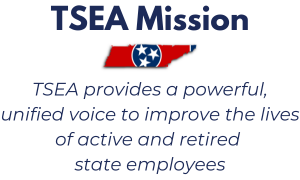By Gwen Tuttle / TSEA Compensation and Benefits Manager
Department of Human Resources policy permits In-Range hiring salary exceptions when a job classification has proven to be difficult to fill due to high turnover, lack of qualified applicants, or other market factors. In-range hiring salary exceptions serve as an incentive to draw qualified applicants to these hard-to-fill positions.
Because of this, employees need to become much more familiar with in-range hiring policies, as they may currently be in a position that is approved under an in-range hiring exception and not even know it. The amount will depend on the factors creating the need and will vary by position but in-range exceptions may be two, three, or more steps above the minimum of the salary grade.
An agency wishing to fill a position in a job class or a subsection of positions within a job class and approved for in-range hiring must follow standard preferred service appointment processes. When notifying applicants on a referral list, invitations must declare the approved starting in-range salary rate of the position in question.
Most state workers and prospective employees are aware that the majority of salaries for Tennessee state government positions are lower compared to those in surrounding states, Metro-Nashville government, Federal Government, and among other large employers. Thus, it is no surprise that DOHR must utilize such exceptions in order to fill a number of state positions. While it may be gratifying to know that the need for higher salaries among some positions is addressed using this method, it can also have a downside.
The downside occurs when, at some point in their career, an employee considers transferring or taking a promotion and discovers that their offered salary amount was an exception to standard policy. While this may seem unlikely, it happens more often than you would expect. When this employee wants to move from a position that was granted an in-range hiring exception to one that is not within their current job series or not approved for an in-range hiring salary exception, the employee’s salary will be reduced by the amount of the in-range hiring exception first. Thus, an employee’s salary can actually be reduced a fair amount even for a lateral transfer. And in a promotional situation, an employee may not experience any salary benefit for taking a position in a higher salary grade if the in-range hiring loss is greater than the promotional increase to which they may be entitled. In fact, the employee could see an over-all reduction in salary.
We bring this to your attention because we have seen a growing number of employees in recent yearsw that have been adversely affected by in-range hiring exceptions. Awareness of this policy exception is the key to reducing adverse effects. Should you consider moving within state government, be sure you know the salary consequences of leaving your current position before you make an offical move.
A copy of the DOHR policy described in this article can be found on DOHR’s website.













